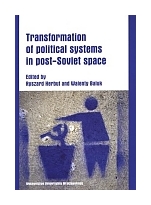|

TRANSFORMATION OF POLITICAL SYSTEMS IN POST-SOVIET SPACE
HERBUT R. BALUK W. EDITORS wydawnictwo: WYD UN WROCŁAW , rok wydania 2010, wydanie I cena netto: 22.33 Twoja cena 21,21 zł + 5% vat - dodaj do koszyka Transformation of political systems in post-Soviet space
Introduction
Chapter I
Socio-political and cultural background of change in the former Soviet Union
states
1. Cultural background of change
1.1. Cultural background of change in the Baltic states
1.2. Cultural background of change in countries of Eastern Europe
1.3. Cultural background of change in countries of South Caucasus
1.4. Cultural background of change in countries of Central Asia
2. Socio-political background of change
2.1. Baltic states
2.2. Countries of Eastern Europe
2.3. Countries of South Caucasus
2.4. Countries of Central Asia
Chapter II
Institutional background of political transformation
1. Political regimes of post-Soviet states
1.1. Concept and typology of political regimes
1.2. Parliamentarism and presidentialism in post-Soviet countries
1.3. Types of political regimes and development of democracy in post-Soviet countries
2. Judicial power in post-Soviet countries
2.1. Introduction
2.2. Structure of judicial system
2.2.1. Baltic states
2.2.2. Slavic states
2.2.3. Moldova
2.2.4. Caucasian states
2.2.5. Central Asian states
2.3. Status of judges
2.4. Constitutional courts
2.5. Political power of courts
2.6. Judicial independence
3. Electoral practice in post-Soviet states versus democratic standards
3.1. Importance of elections in the USSR in historical perspective — up to the fall of
the “iron curtain”
3.2. Democracy, human rights, electoral process versus universal system of legal
protection
3.3. Regional legal agreements to protect human rights
3.4. Electoral law in post-Soviet states versus OSCE standard compliance criteria
3.5. Political context
3.6. Legal system
3.7. Electoral system
3.8. Electoral administration
3.9. Election campaign
3.10. Voting procedures
3.11. Conclusion
Chapter III
The evolution of political society
1. Development of political parties and party systems in post-Soviet states
1.1. Baltic states
1.1.1. Parties and party system in Lithuania
1.1.1.1. Blocs (families) of political parties
1.1.1.2. Party system in Lithuania
1.1.2. Parties and party system in Latvia
1.1.2.1. Blocs (families) of political parties
1.1.2.2. Party system in Latvia
1.1.3. Parties and party system in Estonia
1.1.3.1. Blocs (families) of political parties
1.1.3.2. Party system in Estonia
1.2. Countries of Eastern Europe
1.2.1. Party system in Moldova
1.2.2. Party system in Ukraine
1.2.3. Party system in Russia
1.2.4. Proto-system in Belarus
1.3. Countries of South Caucasus
1.3.1. Party system in Armenia
1.3.2. Party system in Georgia
1.3.3. Party system in Azerbaijan
1.4. Parties and proto-systems in Central Asian states
1.4.1. Republic of Kazakhstan
1.4.2. Kyrgyz Republic
1.4.3. Republic of Tajikistan
1.4.4. Republic of Uzbekistan
1.4.5. Turkmenistan
1.5. Conclusions
2. Economic transformation in the CIS
2.1. Introduction
2.2. Economic transformation — an overview
2.3. General economic characteristics of the CIS
2.4. Economic crisis in the fi rst stage of the CIS countries’ transformation
2.5. Internal economic transformation in the CIS countries
2.6. Transformation of business environment
2.7. Transformation of external economic relations in the CIS countries
2.8. Final conclusions
3. Industrial relations and social dialogue in the post-Soviet area
3.1. Introduction
3.2. Tripartite relations in post-Soviet practice — general comments and selection of
case studies
3.3. Arenas and environments of industrial relations in Baltic states — main data
comparisons
3.4. Main actors and central institutions of industrial relations in Estonia
3.5. Main actors and central institutions of industrial relations in Lithuania
3.6. Main actors and central institutions of industrial relations in Latvia
3.7. Industrial relations in Russia and post-Soviet countries — in search of an
analytical model
3.8. Main characteristics of post-Soviet Russian model of industrial relations
3.9. Summary
Chapter IV
Selected aspects of civil society development
1. Changes in the media and in political communication in post-Soviet countries
1.1. Periodisation
1.2. Democratisation of media systems
1.3. System evaluation according to the press freedom criterion
1.4. Repressions against journalists and editors
1.5. Eurasian system
1.6. Public media
1.7. Importance of the internet
1.8. Media links with business
1.9. Media in political communication
1.10. Russia’s cultural influence
1.11. Conclusions
2. Protection of human rights in post-Soviet countries
2.1. UN standards of human rights protection
2.2. Impact of CSCE/OSCE on human rights
2.3. Council of Europe standards and the problem of their implementation in national legal
systems
2.4. Courts and human rights
2.5. Institution of ombudsman
2.6. Civil society. NGOs for human rights. Problems in the functioning of NGOs
2.7. Conclusion
Annex A
Abbreviations of names of political parties and electoral coalitions
Annex B
Electoral systems in post-Soviet states and results of selected elections
Bibliography
List of tables
List of figures
Index
324 pages, Paperback
Księgarnia nie działa. Nie odpowiadamy na pytania i nie realizujemy zamówien. Do odwolania !.
|


